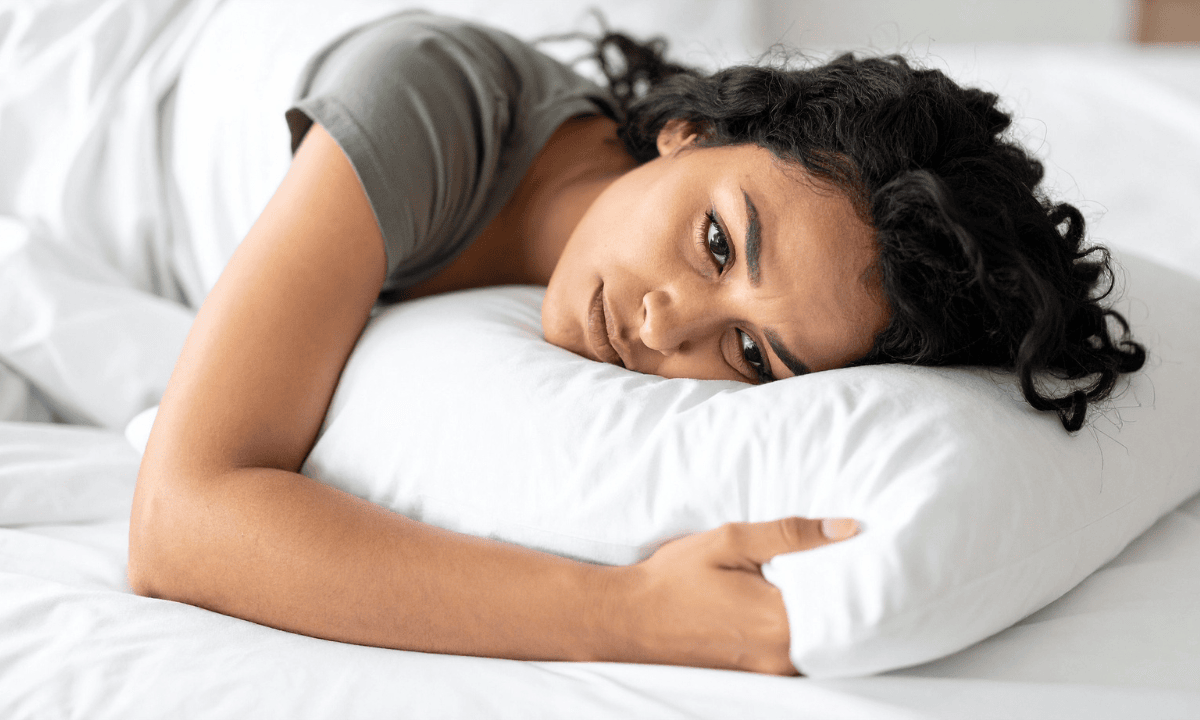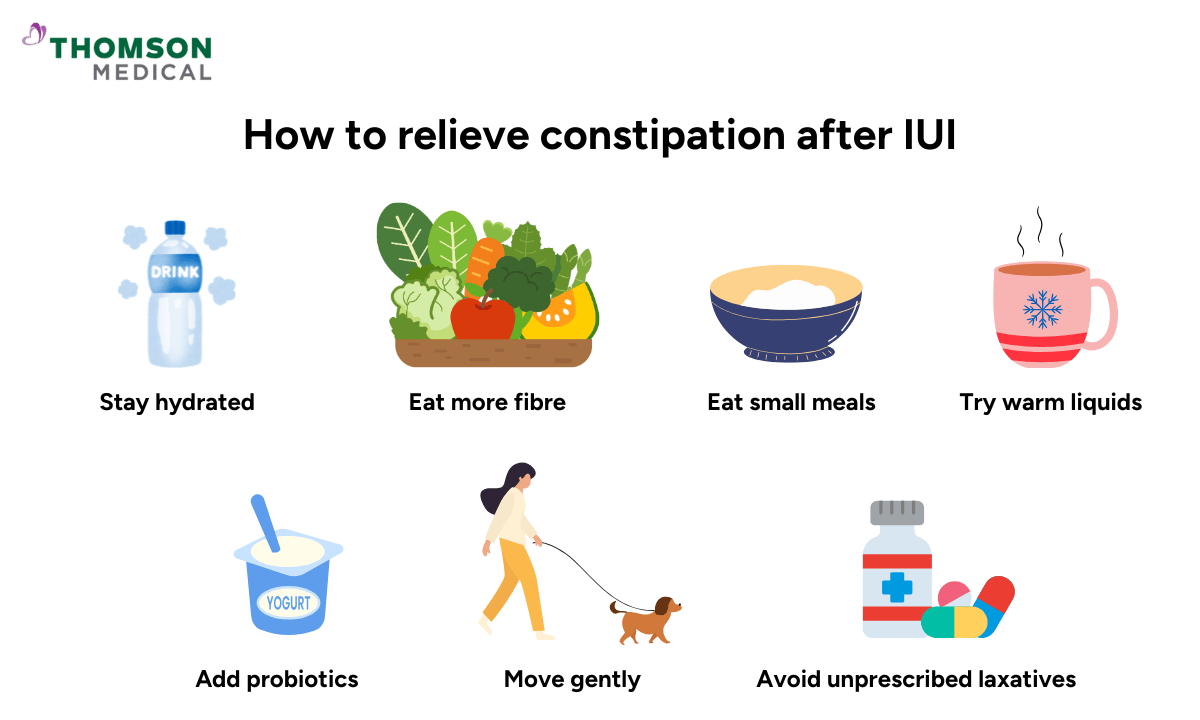It’s common to feel a bit off after an intrauterine insemination (IUI) procedure, as your body is undergoing hormonal changes. You may experience mild constipation during this time, especially if you’re taking progesterone supplements, as these can slow down your bowel movements.
Although it can be uncomfortable, it's normal and only lasts for a short time. Let's take a closer look at what causes it and how you can ease the discomfort.
Is constipation common after IUI?
Constipation after an IUI procedure is very common. It happens when you have fewer bowel movements or they are harder to pass. Everyone has different "normal" bowel habits, but if you don't have a bowel movement for more than three days, your stool may dry out and become hard, making it difficult or even painful to pass.
You might also feel like you haven't completely emptied your bowels or need to push too hard when you go to the toilet. Both symptoms are signs of constipation.
Causes of constipation after IUI

While IUI itself doesn't cause constipation, the progesterone supplements that are often given afterward can slow down your digestive system. Combined with hormonal changes and changes in your daily routine during the waiting period, this can lead to uncomfortable constipation. Here’s how these factors contribute to constipation after IUI.
Progesterone supplementation
After an IUI procedure, your doctor usually gives you progesterone supplements (either by mouth, in the vagina, or by injection) to help the lining of your womb thicken and make it easier for the embryo to implant. However, progesterone also relaxes the muscles in the digestive tract, which slows down bowel movements and increases the risk of constipation.
Natural hormonal changes
Even without supplements, your body produces more progesterone after ovulation. This rise helps the womb get ready for pregnancy, but it can also reduce bowel movement frequency and make stools harder to pass.
Reduced physical activity
Some women choose to limit their movement or stay in bed for long hours after IUI to “play it safe”. Getting enough rest is beneficial, but too much inactivity can reduce gut movement, which can lead to bloating and constipation.
Dietary changes and stress
Fertility treatment often comes with emotional stress and shifts in appetite. These changes can lead you to eat less, skip fibre-rich foods, or forget to drink enough water, all of which can cause constipation. Stress and anxiety about the outcome of the treatment can also slow down your digestive system.
Does constipation affect IUI success?
Constipation doesn't affect your chances of having a successful IUI. Although it may be uncomfortable, constipation doesn't stop sperm from implantation, embryos from growing, or hormones from supporting the pregancy process.
However, too much straining, anxiety, or physical discomfort can make stress worse, which could affect your emotional health. Taking care of your digestive health can help you stay calm, comfortable, and focused on your fertility journey.
At Thomson Fertility Centre, our specialists provide personalised care and advice to help you manage any post-IUI discomfort, so you can focus on your journey to parenthood. Request an appointment today.
Our fertility doctor in Singapore
Loading...
How long does post-IUI constipation usually last?
Constipation after IUI is usually temporary. For most women, bowel movements go back to normal in a few days to a week. If you’re taking progesterone supplements, the discomfort may last a little longer until you stop taking progesterone or start your pregnancy care.
How to relieve constipation after IUI?

You can deal with constipation after IUI by making some simple changes to your daily routine and taking care of yourself.
Stay hydrated:
Drink at least 8-10 glasses of water per day to soften stool and supports digestion
Eat more fibre:
High-fibre foods like whole grains, leafy greens, beans, lentils, pears, apples (with skin), and prunes help keep your bowel movements regular.
Eat smaller meals more often:
Eating smaller amounts of food throughout the day is easier to digest and prevents bloating.
Try warm liquids:
Drinking warm water, herbal teas like chamomile or ginger, or warm lemon water in the morning may help stimulate a bowel movement naturally.
Add probiotics:
Yoghurt, kefir, or probiotic supplements approved by your doctor can promote healthy gut bacteria and ease digestion.
Light exercises:
Light activities such as walking, yoga, or stretching can help your digestion and keep your bowels working properly.
Don't take laxatives that aren't prescribed:
Some over-the-counter laxatives are not safe during early pregnancy or may affect hormone absorption.
What foods should I avoid if I’m constipated after IUI?
If you’re experiencing constipation after an IUI procedure, it’s best to avoid foods that can worsen it. These are some of them:
Processed foods:
Chips, white bread, pastries, and fast food are low in fibre and can slow down your bowel movements.
High-fat dairy products:
Cheese, cream, and full-fat milk may cause bloating or make stools harder to pass.
Red meat:
It's harder to digest and can contribute to constipation.
Fried or greasy foods:
These foods can make your stomach take longer to empty and make you feel heavy or bloated.
Excess caffeine:
Drinking too much coffee, tea, or energy drinks can make you dehydrated, which makes constipation worse.
When should you seek medical advice?
Mild constipation is usually not a serious condition and goes away on its own. But, if you experience any of the following symptoms, you should consult your fertility specialist:
No bowel movement for more than 3 days
Severe abdominal pain, cramping, or bloating
Rectal bleeding or painful straining
Feeling like you haven't fully emptied your bowels for several days
Worsening symptoms that affect sleep or eating
Your doctor can check for other causes, recommend safe medication, or change your progesterone dosage if needed.
If you’re feeling uncomfortable or unsure about your symptoms, request an appointment with our fertility specialists at Thomson Medical. Early guidance and gentle care can help you stay comfortable throughout your fertility journey.
FAQ
How soon after IUI does constipation start?
Constipation can happen 6-12 days after an IUI procedure, usually around the time of implantation. This timing is usually linked to hormonal changes, like rising progesterone levels, and the use of fertility medications. Some women may notice symptoms earlier or later, while others may not experience constipation at all.
Can fertility treatment cause constipation?
Yes, constipation is a common side effect of fertility treatments, especially if you’re taking progesterone supplements. Whether taken orally, vaginally, or by injection, progesterone slows down bowel movements, leading to harder, drier stools that are more difficult to pass.
Other fertility medications, such as clomiphene, letrozole, or human chorionic gonadotropin (hCG), can also cause bloating or slower digestion. Anxiety, dietary changes, and reduced physical activity during the two-week wait can make it worse.
Can constipation be caused by implantation?
Yes, it’s possible. Some women have mild constipation in early pregnancy, which can occur around the time of implantation after IUI (usually 6-12 days after ovulation or IUI). This happens mostly because progesterone levels are rising, which relaxes the muscles in the intestines and slows down digestion. Constipation isn't a definite sign of implantation, but it could happen around the same time as your body's early pregnancy response.
Does constipation stop conception?
No, constipation doesn’t affect your ability to conceive. It doesn’t interfere with fertilisation, sperm movement, or embryo implantation. However, ongoing constipation can make you feel uncomfortable and increase stress, which might affect how you feel during your fertility journey.
Can I take laxatives or stool softeners after IUI?
Most women think that mild stool softeners are safe to use after an IUI procedure, but it's best to check with your fertility doctor first. Products that contain docusate sodium are usually safe to use during early pregnancy or after IUI.
But you should not take strong stimulant laxatives like bisacodyl or sennosides unless your doctor tells you to. These drugs can cause cramps or affect absorption of important hormones like progesterone.
The information provided is intended for general guidance only and should not be considered medical advice. For personalised recommendations and advice based on your unique situation, please consult a specialist at Thomson Medical. Request an appointment with Thomson Medical today.
